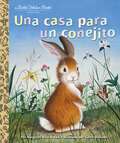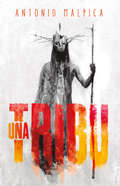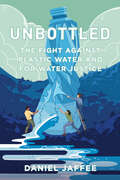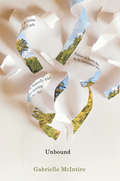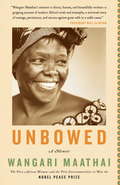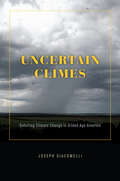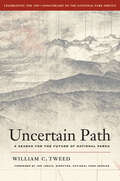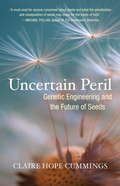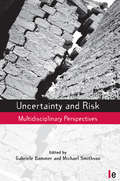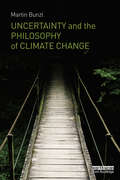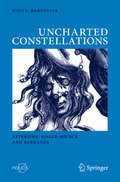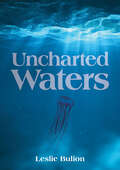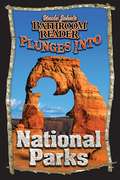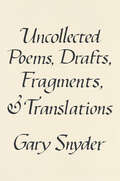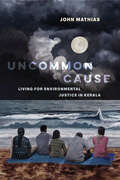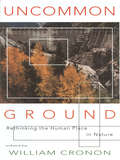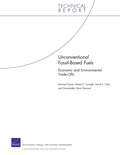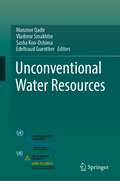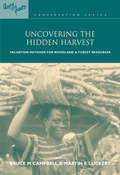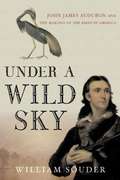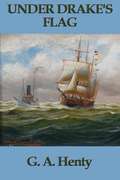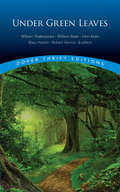- Table View
- List View
Una casa para un conejito (Little Golden Book)
by Margaret Wise BrownPor primera vez una edición en español de Home for a Bunny, un clásico Little Golden Book. Una casa para un conejito, la edición en español de Home for a Bunny—la entrañable historia de un conejito en busca de un hogar—brinda la oportunidad a más de 37 millones de hispanohablantes que residen en Estados Unidos de disfrutar de la maravillosa experiencia de leer este clásico Little Golden Book. Traducida al español por Teresa Mlawer, una de las figuras más respetadas del mundo editorial hispano, esta historia clásica será el regalo perfecto, a un precio muy razonable, de Pascua o de bienvenida para el bebé.An all-new Spanish translation of the classic Little Golden Book Home for a Bunny. This Spanish-language translation of Home for a Bunny--the beloved story about a bunny looking for a home--makes the joyful experience of reading this classic Little Golden Book available to the 37 million Americans who speak Spanish! Newly translated by Teresa Mlawer--one of the most respected figures in Hispanic publishing--this classic storybook is the perfect affordable Easter or baby gift.
Una mirada a los insectos (¡Arriba la Lectura!, Level E #29)
by Cheryl JakabLos insectos tienen cabeza, torso y estómago. ¡También tienen seis patas! NIMAC-sourced textbook
Una nación de parques (¡Arriba la Lectura! Level O #15)
by Kristin CashoreNIMAC-sourced textbook <p><p> Lee sobre el Servicio de Parques Nacionales y los parques que están bajo su cuidado. Descubre cuántos hay, dónde están y por qué son especiales. ¡Haz planes para el primero que deseas visitar!
Una tribu
by Antonio Malpica"Cada quién lleva un tatuaje distinto al de todos los demás en su interior. Y eso, a fin de cuentas, es su mayor fortaleza". "A veces siento que todo lo que impide al ser humano caminar descalzo por la hierba es una gran mentira." El gran jefe Tenaya y su pueblo habitan plácidamente el valle prohibido de Yosemite, a los pies del Capitán, el monolito preferido que hoy en día escalan los montañistas más atrevidos. Pero en 1850, aquella tribu tuvo que enfrentar una persecución sin tregua, una partida de ajedrez con los invasores del territorio piel roja. Petirrojo, hijo de Tenaya, sabe que su gente es de espíritu despreocupado, pero en su interior bullen las tribulaciones: la inseguridad frente a los talentos de sus hermanos, carismáticos y decididos; el temor de defraudar a su padre, y la vacilación ante el amor de Luz de Día, su amada desde niños. ¿Quién no ha temido quedar mal conquienes más le importan? A Tenaya le basta una vida simple y feliz para que su paso por la tierra sea provechoso, pero en ocasiones se necesita demostrar algo, a sí mismo y a los demás. Hasta ahora, Petirrojo no sabe para qué está en el mundo y se lo reprocha, pero se dará cuenta de que se necesita algo más que fuerza y astucia para vencer al enemigo, y poder así ser digno y libre. ¿Acaso una persona o una nación entera dejaría de existir si no alcanzara un sitio en la memoria del mundo? ¿Qué audacia tan grande se necesitará intentar en esta vida para que los demás te recuerden?
Unbottled: The Fight against Plastic Water and for Water Justice
by Daniel JaffeeAn exploration of bottled water's impact on social justice and sustainability, and how diverse movements are fighting back. In just four decades, bottled water has transformed from a luxury niche item into a ubiquitous consumer product, representing a $300 billion market dominated by global corporations. It sits at the convergence of a mounting ecological crisis of single-use plastic waste and climate change, a social crisis of affordable access to safe drinking water, and a struggle over the fate of public water systems. Unbottled examines the vibrant movements that have emerged to question the need for bottled water and challenge its growth in North America and worldwide. Drawing on extensive interviews with activists, residents, public officials, and other participants in controversies ranging from bottled water's role in unsafe tap water crises to groundwater extraction for bottling in rural communities, Daniel Jaffee asks what this commodity's meteoric growth means for social inequality, sustainability, and the human right to water. Unbottled profiles campaigns to reclaim the tap and addresses the challenges of ending dependence on packaged water in places where safe water is not widely accessible. Clear and compelling, it assesses the prospects for the movements fighting plastic water and working to ensure water justice for all.
Unbound (Hugh MacLennan Poetry Series #59)
by Gabrielle McIntireinside sadness is glory / if you see it right way round, / find the seam, reverse it to perspectivize, / unwind light, joy's unravelling spoolInspired by mystical traditions, birdwatching, tree planting, ethics, neuropsychology, and quantum physics, Gabrielle McIntire's poems draw us in with their passionate attention to what it means to be human in a still-wondrous natural environment.Touching on human frailty, the eternal, and the ecological with a delicate and evocative brush, Unbound enacts an almost prayerful attentiveness to the earth's creatures and landscapes while it offers both mournful and humorous treatments of love and loss. McIntire's finely tuned musical voice – with its incantatory rhythms, rhymes, sound play, and entrancing double meanings – invites us to be courageously open to the unexpected.Unbound stirs us to re-evaluate our place amidst the astonishing beauty and wisdom of an Earth facing the early stages of climate change.
Unbowed: One Woman's Story
by Wangari MaathaiIn Unbowed, Nobel Prize winner Wangari Maathai recounts her extraordinary journey from her childhood in rural Kenya to the world stage. When Maathai founded the Green Belt Movement in 1977, she began a vital poor people's environmental movement, focused on the empowerment of women, that soon spread across Africa. Persevering through run-ins with the Kenyan government and personal losses, and jailed and beaten on numerous occasions, Maathai continued to fight tirelessly to save Kenya's forests and to restore democracy to her beloved country. Infused with her unique luminosity of spirit, Wangari Maathai's remarkable story of courage, faith, and the power of persistence is destined to inspire generations to come.From the Trade Paperback edition.
Uncertain Climes: Debating Climate Change in Gilded Age America
by Joseph GiacomelliUncertain Climes looks to the late nineteenth century to reveal how climate anxiety was a crucial element in the emergence of American modernity. Even people who still refuse to accept the reality of human-induced climate change would have to agree that the topic has become inescapable in the United States in recent decades. But as Joseph Giacomelli shows in Uncertain Climes, this is actually nothing new: as far back as Gilded Age America, climate uncertainty has infused major debates on economic growth and national development. In this ambitious examination of late-nineteenth-century understandings of climate, Giacomelli draws on the work of scientists, foresters, surveyors, and settlers to demonstrate how central the subject was to the emergence of American modernity. Amid constant concerns about volatile weather patterns and the use of natural resources, nineteenth-century Americans developed a multilayered discourse on climate and what it might mean for the nation’s future. Although climate science was still in its nascent stages during the Gilded Age, fears and hopes about climate change animated the overarching political struggles of the time, including expansion into the American West. Giacomelli makes clear that uncertainty was the common theme linking concerns about human-induced climate change with cultural worries about the sustainability of capitalist expansionism in an era remarkably similar to the United States’ unsettled present.
Uncertain Path: A Search for the Future of National Parks
by William C. TweedIn this provocative walking meditation, writer and former park ranger William Tweed takes us to California’s spectacular High Sierra to discover a new vision for our national parks as they approach their 100th anniversary. Tweed, who worked among the Sierra Nevada’s big peaks and big trees for more than thirty years, has now hiked more than 200 miles along California’s John Muir Trail in a personal search for answers: How do we address the climate change we are seeing even now—in melting glaciers in Glacier National Park, changing rainy seasons on Mt Rainer, and more fire in the West’s iconic parks. Should we intervene where we can to preserve biodiversity? Should the parks merely become ecosystem museums that exhibit famous landscapes and species? Asking how we can make these magnificent parks relevant for the next generation, Tweed, through his journey, ultimately shows why we must do just that.
Uncertain Peril
by Claire Hope CummingsLife on earth is facing unprecedented challenges from global warming, war, and mass extinctions. The plight of seeds is a less visible but no less fundamental threat to our survival. Seeds are at the heart of the planet's life-support systems. Their power to regenerate and adapt are essential to maintaining our food supply and our ability to cope with a changing climate. In Uncertain Peril, environmental journalist Claire Hope Cummings exposes the stories behind the rise of industrial agriculture and plant biotechnology, the fall of public interest science, and the folly of patenting seeds. She examines how farming communities are coping with declining water, soil, and fossil fuels, as well as with new commercial technologies. Will genetically engineered and "terminator" seeds lead to certain promise, as some have hoped, or are we embarking on a path of uncertain peril? Will the "doomsday vault" under construction in the Arctic, designed to store millions of seeds, save the genetic diversity of the world's agriculture? To answer these questions and others, Cummings takes readers from the Fertile Crescent in Iraq to the island of Kaua'i in Hawai'i; from Oaxaca, Mexico, to the Mekong Delta in Vietnam. She examines the plight of farmers who have planted transgenic seeds and scientists who have been persecuted for revealing the dangers of modified genes. At each turn, Cummings looks deeply into the relationship between people and plants. She examines the possibilities for both scarcity and abundance and tells the stories of local communities that are producing food and fuel sustainably and providing for the future. The choices we make about how we feed ourselves now will determine whether or not seeds will continue as a generous source of sustenance and remain the common heritage of all humanity. It comes down to this: whoever controls the future of seeds controls the future of life on earth. Uncertain Peril is a powerful reminder that what's at stake right now is nothing less than the nature of the future.
Uncertainty and Risk: Multidisciplinary Perspectives
by Gabriele Bammer Michael Smithson�This is a major, and deeply thoughtful, contribution to understanding uncertainty and risk. Our world and its unprecedented challenges need such ways of thinking! Much more than a set of contributions from different disciplines, this book leads you to explore your own way of perceiving your own area of work. An outstanding contribution that will stay on my shelves for many years.� Dr Neil T. M. Hamilton, Director, WWF International Arctic Programme �This collection of essays provides a unique and fascinating overview of perspectives on uncertainty and risk across a wide variety of disciplines. It is a valuable and accessible sourcebook for specialists and laypeople alike.� Professor Renate Schubert, Head of the Institute for Environmental Decisions and Chair of Economics at the Swiss Federal Institute of Technology �This comprehensive collection of disciplinary perspectives on uncertainty is a definitive guide to contemporary insights into this Achilles� heel of modernity and the endemic hubris of institutional science in its role as public authority. It gives firm foundations to the fundamental historic shift now underway in the world, towards normalizing acceptance of the immanent condition of ignorance and of its practical corollaries: contingency, uncontrol, and respect for difference.� Brian Wynne, Professor of Science Studies, Lancaster University �Bammer and Smithson have assembled a fascinating, important collection of papers on uncertainty and its management. The integrative nature of Uncertainty and Risk makes it a landmark in the intellectual history of this vital cross-disciplinary concept.� George Cvetkovich, Director, Center for Cross-Cultural Research, Western Washington University Uncertainty governs our lives. From the unknowns of living with the risks of terrorism to developing policies on genetically modified foods, or disaster planning for catastrophic climate change, how we conceptualize, evaluate and cope with uncertainty drives our actions and deployment of resources, decisions and priorities. In this thorough and wide-ranging volume, theoretical perspectives are drawn from art history, complexity science, economics, futures, history, law, philosophy, physics, psychology, statistics and theology. On a practical level, uncertainty is examined in emergency management, intelligence, law enforcement, music, policy and politics. Key problems that are a subject of focus are environmental management, communicable diseases and illicit drugs. Opening and closing sections of the book provide major conceptual strands in uncertainty thinking and develop an integrated view of the nature of uncertainty, uncertainty as a motivating or de-motivating force, and strategies for coping and managing under uncertainty.
Uncertainty and the Philosophy of Climate Change
by Martin BunzlWhen it comes to climate change, the greatest difficulty we face is that we do not know the likely degree of change or its cost, which means that environmental policy decisions have to be made under uncertainty. This book offers an accessible philosophical treatment of the broad range of ethical and policy challenges posed by climate change uncertainty. Drawing on both the philosophy of science and ethics, Martin Bunzl shows how tackling climate change revolves around weighing up our interests now against those of future generations, which requires that we examine our assumptions about the value of present costs versus future benefits. In an engaging, conversational style, Bunzl looks at questions such as our responsibility towards non-human life, the interests of the developing and developed worlds, and how the circumstances of poverty shape the perception of risk, ultimate developing and defending a view of humanity and its place in the world that makes sense of our duty to Nature without treating it as a rights bearer. This book will be of interest to students and scholars of environmental studies, philosophy, politics and sociology as well as policy makers.
Uncharted Constellations
by John C. BarentineThis book compiles an array of interesting constellations that fell by the wayside before the IAU established the modern canon of constellations. That decision left out lesser known ones whose history is nevertheless interesting, but at last author John Barentine is giving them their due. This book is a companion to "The Lost Constellations", highlighting the more obscure configurations. The 16 constellations found in this volume fall into one or more of three broad categories: asterims, such as the Big Dipper in Ursa Maj∨ single-sourced constellations introduced on surviving charts by a cartographer perhaps currying the favor of sponsors; and re-brands, new figures meant to displace existing constellations, often for an ideological reason. All of them reveal something unique about the development of humanity's map of the sky.
Uncharted Waters
by Leslie BulionMost teenage boys would love to spend a summer with a bachelor uncle in a seaside cabin. But not Jonah Lander. He has secrets—lots of them—and they weigh heavily on his mind. One deception leads to another, and he lies to his Uncle Nate about joining the local swim team, not wanting to explain his fear of the dark salt water. When Sumi, a budding marine biologist, asks him to be her research assistant, he jumps at the chance to make some money. But he gets into a lot more than he bargained for. Soon he will have to face his greatest fears and give up his secrets forever.Bulion's satisfying novel is further enhanced by a rich ensemble of supporting characters, interesting facts about marine life, and a text that perfectly captures the special rhythms of small town seaside living.
Uncle John's Bathroom Reader Plunges into National Parks (Plunges Into)
by Bathroom Readers' Hysterical SocietyIf you like the great outdoors, you're going to love this book. We're plunging into every national park, monument, site, and trail (more than 150 in all!) in true Uncle John fashion and uncovering some unique stories behind all of them. You're sure to find hidden facets of each national park that you never imagined. Read about...- Yosemite's firefall and why it came to a sudden end- How to avoid bear attacks, buffalo stampedes, and moose on the loose- Ghosts, legends, and myths in the remotest parks of the country- The wild horses of Assateague and why they still roam the island- How an isolated tree in Yosemite inspired the most famous photograph of all timeAnd much more!
Uncollected Poems, Drafts, Fragments, and Translations
by Gary SnyderA collection of previously uncollected and unpublished works by a Pulitzer Prize-winning Beat poet Gary Snyder, written during his most productive and important yearsFar from being a simple miscellany of poems, Uncollected Poems, Drafts, Fragments, and Translations contains some of Gary Snyder&’s best work, written during his most productive and important years.Many of these have been published in magazines or as broadsides, including Spel Against Demons, Dear Mr. President, Hymn to the Goddess San Francisco, Smokey the Bear Sutra, A Curse on the Men in Washington, Pentagon. The collection also includes a great number of translations from Chinese and Japanese poets. Much of this work has been gleaned from journals, manuscripts and correspondence, and never before published in any form.
Uncommon Cause: Living for Environmental Justice in Kerala
by John MathiasHow can activists strike a balance between fighting for a cause and sustaining relationships with family, friends, and neighbors? Uncommon Cause follows environmental justice activists in Kerala, India, as they seek out, avoid, or strive to overcome conflicts between their causes and their community ties. John Mathias finds two contrasting approaches, each offering distinct possibilities for an activist life. One set of activists repudiates community ties and resists normative pressures; for them, environmental justice becomes a way of transcending all local identities and affiliations, even humanity itself. Other activists seek to ground their activism in community belonging, to fight for their own people. Each approach produces its own dilemmas and offers its own insights into ethical tensions we all face between taking a stand and standing with others. In sharing Kerala activists’ diverse stories, Uncommon Cause offers a fresh perspective on environmental ethics, showing that environmentalism, even as it looks beyond merely human concerns, is still fundamentally about how we relate to other people.
Uncommon Crochet: Twenty-Five Projects Made from Natural Yarns and Alternative Fibers
by Julie Armstrong HoletzBlack leather granny squares are anything but square, and hot pink organic hemp gives crocheted vases a decidedly modern cachet. In Uncommon Crochet, designer Julie Armstrong Holetz applies new ideas and unconventional materials--like wire, raffia, jute, sisal, recycled belts, fabric strips, and felted beads--to twenty-five patterns for bins, baskets, totes, handbags, clutches, jewelry, and more. Step-by-step instructions, detailed how-to photographs, and essential advice about creativity, design, and experi-mentation encourage you to play with fiber, add funky embellishments, and use your creative spirit to customize any pattern--even the ones in this book! From practical containers like Red's Goodie Basket (a stylish home for your WIP--works in progress) and Vintage Satchel (a sturdy retro messenger bag) to just plain fun projects like Petite Fleur Vases (tiny bud vases that hold water) and Sushi (crocheted California rolls, anyone?), Uncommon Crochet offers fresh twists on old-school techniques that turn simple projects into gift-worthy creations.
Uncommon Ground: Rethinking the Human Place in Nature
by William CrononA controversial, timely reassessment of the environmentalist agenda by outstanding historians, scientists, and critics. In a lead essay that powerfully states the broad argument of the book, William Cronon writes that the environmentalist goal of wilderness preservation is conceptually and politically wrongheaded. Among the ironies and entanglements resulting from this goal are the sale of nature in our malls through the Nature Company, and the disputes between working people and environmentalists over spotted owls and other objects of species preservation. The problem is that we haven't learned to live responsibly in nature. The environmentalist aim of legislating humans out of the wilderness is no solution. People, Cronon argues, are inextricably tied to nature, whether they live in cities or countryside. Rather than attempt to exclude humans, environmental advocates should help us learn to live in some sustainable relationship with nature. It is our home.
Unconventional Fossil-Based Fuels
by David S. Ortiz Michael Toman Aimee E. Curtright Joel Darmstadter Brian ShannonIn this report, RAND researchers assess the potential future production levels, production costs, greenhouse gases, and other environmental implications of synthetic crude oil from oil sands and fuels produced via coal liquefaction relative to conventional petroleum-based transportation fuels. The findings indicate the potential cost-competitiveness of these alternative fuels and potential economic-environmental trade-offs from their deployment.
Unconventional Water Resources
by Vladimir Smakhtin Manzoor Qadir Sasha Koo-Oshima Edeltraud GuentherThe world is faced with a growing number of complex and interconnected challenges. Water is among the top 5 global risks in terms of impacts, which would be far reaching beyond socio-economic challenges, impacting livelihoods and wellbeing of the people.As freshwater resources and population densities are unevenly distributed across the world, some regions and countries are already water scarce. Water scarcity is expected to intensify in regions like the Middle East and North Africa (MENA), which has 6% of the global population, but only 1% of the world’s freshwater resources. Climate change adds to this complexity as it is leading to rainfall uncertainty and extended droughts periods, mostly in arid areas.Increasing water scarcity is now recognized as a major cause of conflict, social unrest and migration and at the same time water is increasingly considered as an instrument for international cooperation to achieve sustainable development. Tapping and assessing sustainably every available option in water-scarce areas is needed as pressure continues to build on limited water resources.The stark fact is that conventional water provisioning approaches relying on snowfall, rainfall and river runoff are not enough to meet growing freshwater demand in water-scarce areas. Water-scarce countries need a radical re-think of water resource planning and management that includes the creative exploitation of a growing set of viable but unconventional water resources for food production, livelihoods, ecosystems, climate change adaption, and sustainable development. Unconventional water resources are generated as a by-product of specialized processes; need suitable pre-use treatment; require pertinent on-farm management when used for irrigation; or result from a special technology to collect/access water.
Uncovering the Hidden Harvest: Valuation Methods for Woodland and Forest Resources
by Martin K Luckert Bruce M CampbellForests and woodlands provide an enormous range of goods and services to society, from timber and firewood to medicinal plants, watershed protection, destinations for tourists and sacred sites. Only when these are understood and valued can forests and their resources be properly managed and conserved. This work shows how the complicated network of benefits can be untangled and sets out the different approaches needed to value them. It covers the analysis of plant-based markets, non-market valuation and decision frameworks such as cost-benefit analysis.
Under A Wild Sky: John James Audubon and the Making of The Birds of America
by William SouderThe life and times of a complex genius and the masterpiece he created In the century and a half since Audubon's death, his name has become synonymous with wildlife conservation and natural history. But few people know what a complicated figure he was--or the dramatic story behind The Birds of America. Before Audubon, ornithological illustrations depicted scaled-down birds perched in static poses. Wheeling beneath storm-wracked skies or ripping flesh from freshly killed prey, Audubon's life-size birds looked as if they might fly screeching off the page. The wildness in the images matched the untamed spirit in Audubon--a self-taught painter and self-anointed aristocrat who, with his buckskins and long hair, wanted to be seen as both a hardened frontiersman and a cultured man of science. In truth, neither his friends nor his detractors ever knew exactly who Audubon was or where he came from. Tormented by a fog of ambiguities surrounding his birth, he reinvented himself ceaselessly, creating a life as dramatic as his fictionalizations of it. But when he came east at thirty-eight--broke and desperate to find a publisher for his Birds--he ran squarely into a scientific establishment still wedded to convention and suspicious of the brash newcomer and his grandiose claims. It took Audubon fifteen years to prevail in both his project and his vision. How he triumphed and what drove him is the subject of this gripping narrative.
Under Drake's Flag
by G. A. HentyFrom the "Prince of Storytellers," an exciting account of life on the high seas as seen through the eyes of young Ned Hearne. The brave 16th-century teen sails with Francis Drake, experiences a harsh seafaring life, visits unexplored lands, and witnesses the great naval battle between the English fleet and the Spanish Armada.
Under Green Leaves: A Book Of Rural Poems (classic Reprint) (Dover Thrift Editions)
by Richard Henry StoddardThis treasury of verse rejoices in the pleasures of the countryside and the beauty of the outdoors. Originally published in the mid-19th century, Under Green Leaves offers a wealth of poetry inspired by nature, from lyrics by English dramatists such as William Shakespeare, Ben Jonson, and Beaumont and Fletcher, to works by Metaphysical, Romantic, and Victorian poets.Dozens of enchanting verses include William Blake's "Piping Down the Valleys Wild," "Ode to a Nightingale" by John Keats, Andrew Marvell's "The Garden," and Thomas Campbell's "To the Evening Star." No compilation of nature poetry would be complete without contributions from William Wordsworth, whose "Lines Written in Early Spring" and "To a Skylark" appear here. Other featured poets include John Milton, Alfred Tennyson, Robert Herrick, George Herbert, Mary Howitt, and many other writers whose meditations on flowers, birds, woodlands, and summer evenings remain ever green.
